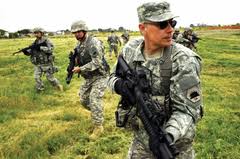California Lets Some Gays Serve Openly In State Militia
Legislation Signals California’s Opposition to Military Discrimination
SANTA BARBARA, CA, – Military analysts this week said that new legislation in California will allow a small number of gays and lesbians to serve openly in the state militia. The law, which was signed by Gov. Arnold Schwarzenegger, is called the “Omnibus Labor and Employment Non-Discrimination Act,” and does not apply to National Guard members. Rather, it applies to members of the State Military Reserve, which is not part of the U.S. military, and is therefore not governed by the “don’t ask, don’t tell” ban on openly gay service members in the armed forces. The law says that “members of the militia of the state shall not be discriminated against in enlistments, promotions, or commissions” on the basis of sexual orientation.
Bridget Wilson, an attorney who serves in the California State Military Reserve and who is an expert on the legal status of U.S. military personnel, explained that the law applies only to those parts of the state militia which are not subject to federal recognition, such as the State Military Reserve. Non-activated members of the National Guard have civilian status, but are subject to the Uniform Code of Military Justice (UCMJ) and “don’t ask, don’t tell.” By contrast, the State Military Reserve is a state defense force, which was authorized by federal law but which retains control over officer appointments and personnel policy.
Wilson said much of the State Military Reserve consists of a small group of professionals, perhaps 1000 strong, who serve in largely volunteer positions to help with training and support for state defense. They can be charged with small arms training, riot control, fire duty, radio communications, legal and medical consulting and assisting with state emergencies such as floods and hurricanes. They are not a combat force; however, they could also be called up for “police-like duty and homeland security.”
Federal authorities could conceivably decide that all members of the state militia who work at a certain task must meet federal standards, including those of the UCMJ and “don’t ask, don’t tell.” But Wilson said that California’s new “Omnibus Labor” law represented a small step toward shrinking discrimination against gays and lesbians who work in the military field. “In terms of practical effects on guardsmen, it’s a symbolic victory, and in military law and practice, you savor your small victories because it’s all you’re going to get.”
Diane H. Mazur, Professor of Law at the University of Florida’s Levin College of Law and an Air Force veteran, applauded California for making a strong statement about its commitment to national security and homeland defense. She said the legislation was an important step in prioritizing security ahead of prejudice. “The enactment of non-discrimination law applicable to the California State Military Reserve is an example of how government acts when it is concerned solely with the strength of our defense and not with how the military can be used to advance socially conservative beliefs,” she said. “We would all be safer if the active-duty military and federalized guard and reserve forces were similarly focused.”
Aaron Belkin, Director of the Center for the Study of Sexual Minorities in the Military at the University of California, Santa Barbara, said that the law might provide a useful opportunity for testing whether cohesion, morale, readiness and retention suffer in the state militia as a result of integration. “The fact that 24 foreign militaries have lifted their gay bans without problems suggests that the rationale for ‘don’t ask, don’t tell’ is not based on evidence. It will be interesting to see whether California’s experiences are consistent with those of other forces that have lifted their gay bans.”
